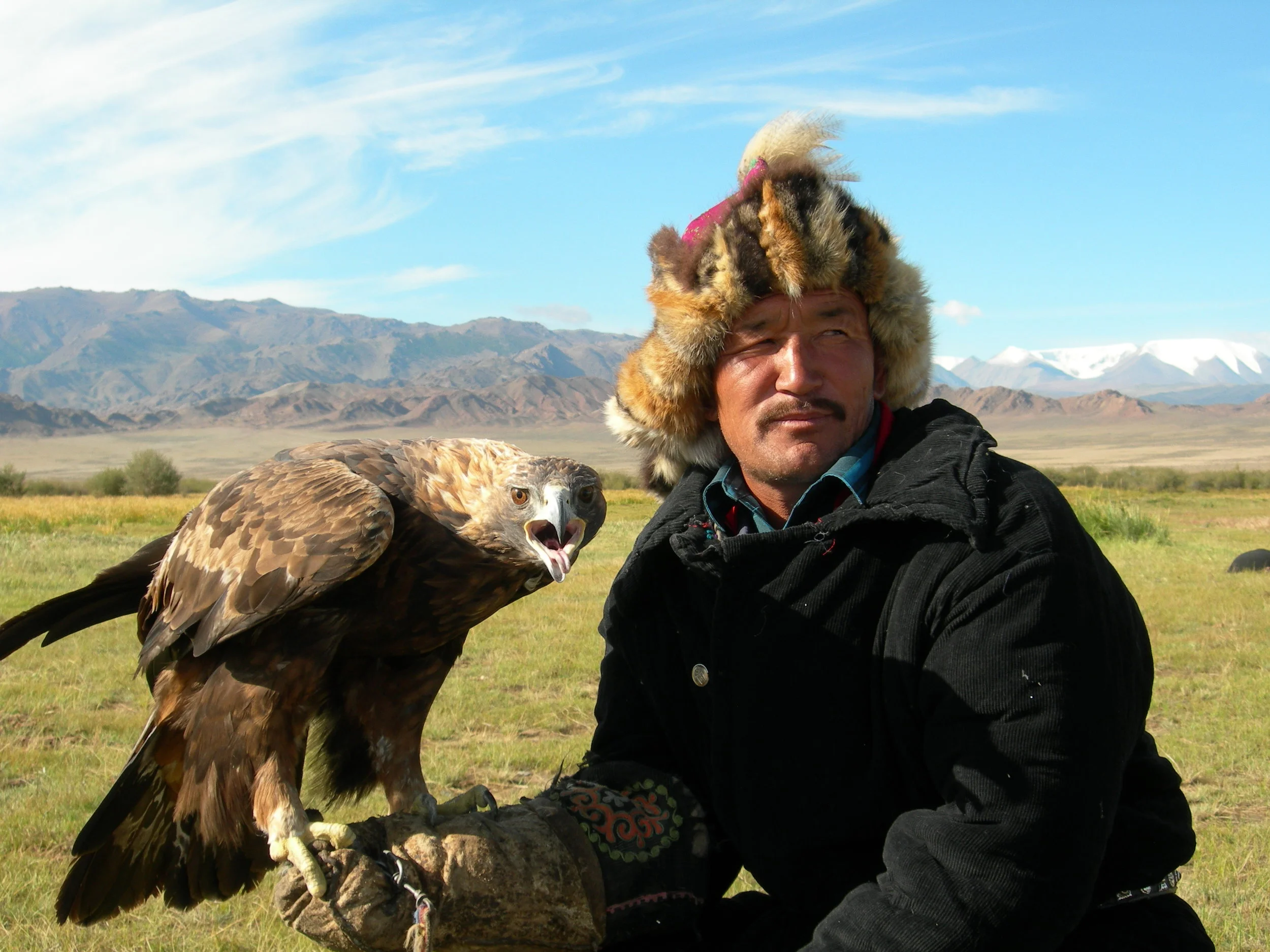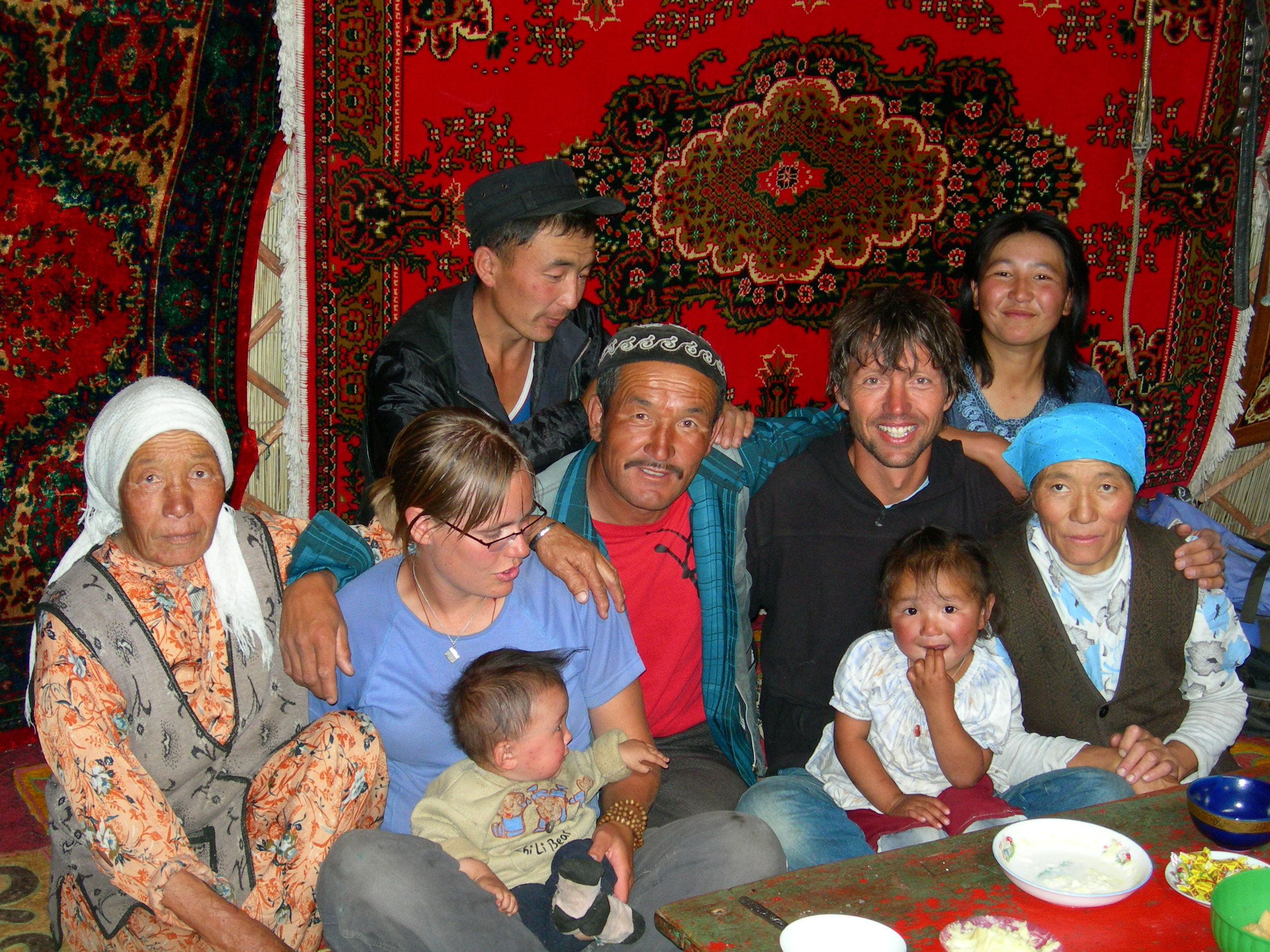5. GLACIERS, SKULLS AND SONGS
My last two weeks in Bayan Olgii were spent living with a Kazakh family out in Bayanuur soum. Aralbai, was an eagle hunter and he lived with his wife, Cozuma, their five sons, one daughter in law, two or three grandchildren and a woman who was presumably a mother or mother-in-law. Their valley was on the northeast side of Tsambagarav Uul in the southern edge of the province. (When I first arrived out west I was riding horses and traveling in the Namarjun valley on the southern side of the same mountain).
The arrangement was fortuitous and abrupt. I had come into Olgii from Ulaanhus Soum for the afternoon to buy vegetables and supplies. While checking my email at the only internet cafe in town, I introduced myself to a backpacker seated next to me. The weren't a lot of foreigners in Olgii as the season was over and few people come out that far west if traveling alone and not with some sort of organized tour. I had been looking for someone to share a jeep out to the countryside. Urs told me he was leaving two days later to stay with a Kazakh eagle hunter family and that I was welcome to join him. So, I went to see this family with my new friend, a forty year old Swiss paraglider who became a good friend and made a fantastic traveling companion -- just open and laid back enough to be happy and at ease in a confusing homestay situation, just awake and comfortable enough to spend hours together in silence and to speak with consideration and knowledge about any number of experiences.
Urs and I spent the first few days with the family walking/riding around, getting introduced to all the relatives and the neighbors, fishing by the river, visiting Aralbai's eagles and the potato fields. We then left for a three day trip out to the glacier at the foot of the mountains, camping and riding our horses eight or nine hours a day. They were long, cold and poignant days. We would ride for hours in silence. Every so often Aralbai would jump from his horse and dart over the hill with his soviet issued rifle from the 50s in pursuit of some rabbit or marmot or wolf. If he didn't return within thirty or forty minutes, I'd start making some tea and try to gauge if we were going to stop there for the night, if I ought to set up my tent and make a fire before the air turned icy.
Again the landscape changes as quickly as the temperature. One hour we would ride up a gushing riverbed of rock with a tight, cold stream that leapt back and forth across the train and a sprinkling of gnarled and twisted trees. The next hour the riverbed would have dried up and turned soft. Around the next bend there would be nothing but sandy and rocky cliffs for miles ahead, and then suddenly, snow and ice. We returned and stayed with the gers and the fields while the boys harvested massive piles of grasses for the winter. A few days later, I left again with Armanbek, the oldest son, to ride into the soum and then up the valley towards the north for another three days. All along the way we visited relatives and his school friends, stopping every few hours at yet another ger for tea and borsak and small talk. I soon realized that I was the new valley photographer. Everywhere I went, people would ask if I had a camera and then demand that I take their portraits. Old men would pull from suitcases old Russian blazers with flurries of medals on the lapels. Their wives would change head scarves and smooth the hair of the children.
My time with the family was surprisingly full of conversation. We used an odd mixture of Kazakh, Mongolian and English and were mostly dependent on my tiny and woefully inadequate Mongolian/English dictionary. The language wasn't comfortable for any of us, but it worked along with a health supplement of gesture and laughter. The family was brilliant. They were pleased that I liked to ride horses and could ride Kazakh style (standing and at high speed). I loved playing with their kids and helping with some cooking when it was allowed. Everyone laughed at my fascination with the most banal and mundane actions around the ger (like the making of noodles for tuivan or the nightly milking of nearly two hundred goats).
My last day with the family happened to be Cosuma's 50th birthday. When Armanbek, Urs and I returned from our horsetrip, the ger was filled with men playing cards and eating fresh boarsak (our daily fried bread). I learned later that all of the men were Aralbai's brothers and a cousin or two of Cozuma's. Aralbai's youngest brother showed up that afternoon with his family from their fall place and set up his ger right beside ours. The vodka first appeared about two o'clock during the card games. One by one each man came over to Cozuma and presented her with a medium sized bottle, conveniently preceding closely the finishing of the last bottle. Eventually, I spotted the half emptied case of bottles near the door. After we finished making borsak, I used the hot oil to fry up some chips which we happily devoured. Some of the women were outside preparing the special meal of the evening all of this time. I had no idea as I never left the ger. I was the designated translator and Aralbai would only talk through me. He was also determined that I sit with the men and learn to play cards. I was happy to stare at his hand and watch the gambling unfold, but I never did learn the rules. i was, however, in close enough proximity to be forced to drink with them all. So, it was quite to my surprise when everyone got up and moved to the carpets at the head of the ger and a large platter was set down before us. The platter held an entire skinned goat head, a mess of organs and sausage and cooked blood and three tiny potatoes. There were two very large knives and a crowd of grinning, smacking Kazakh men waiting for me to eat an ear so they could lunge at the plate. Urs and I sort of looked at each other in fear and for the first time, actually asked for more vodka. Luckily, everyone was so excited at the treat that no one paid any attention to how little I ate and I could hardly even make out the contents of the plate for the flurry of greasy fingers and knives buzzing over the plate. One man spent a good twenty minutes smacking the base of the skull, trying to get at the base of the brain and possibly the spinal cord. I drank quite a lot of vodka and ate all three of the little potatoes.
When the meal was over, a whole other round of drinking began along with hours and hours or singing. We were an ensemble of nearly twenty toasting and swaying and singing and tapping out the beat of one Kazakh folk song after another. Between each song was a toast. All of the sons and grandchildren were off in another ger for the night, and some other older relatives had shown up. The voices were worn and rich and filled with ger. Sometimes the men and women would trade off songs, other times we all sang together. I sang a few old blues songs for Cosuma and Urs gave us a treat of several Swiss German children's songs whose performance required us to stand and perform silly circle dances with linked arms that made a few of us fall over from laughter and drunkenness. Eventually, we began to fade. We settled down on thick woolen carpets, passing out in all the countryside beds and on the floor around the stove. Someone put Urs to bed and I hardly remember climbing into my sleeping bag.
I awoke the next morning to the sound of someone still pounding away at that poor goat skull with the base of Urs' Swiss Army knife. I extracted myself from my bedding and slowly sipped the morning's first bowl of salty tea. We were all a bit fragile that morning. We moved delicately and spoke in soft tones. The river flowed by licking the rocks and my feet as I sat on the grass, watching Aralbai's eagle and writing nothing in particular.







